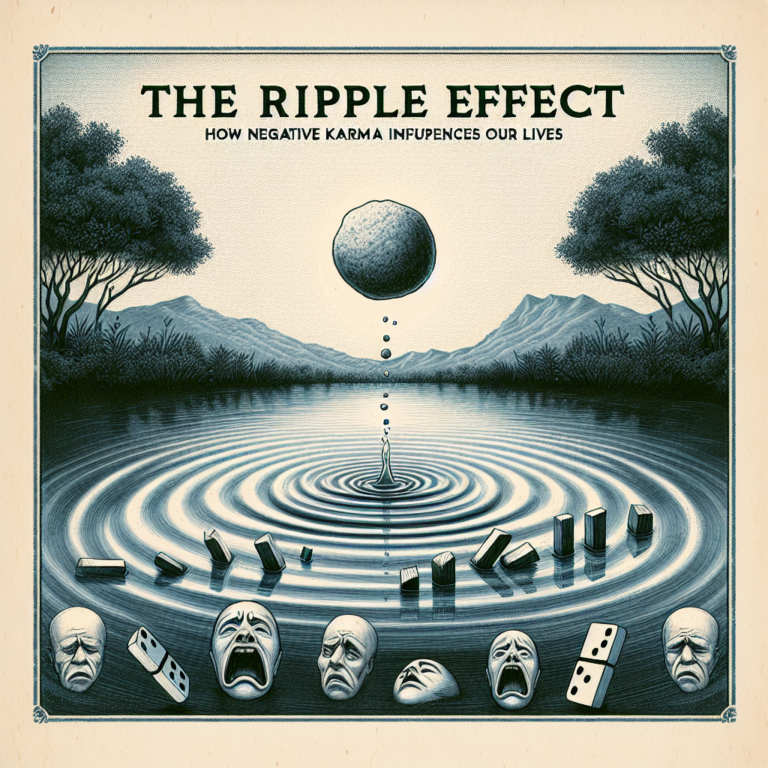Karma is a concept deeply embedded in various spiritual and philosophical traditions, particularly in Hinduism, Buddhism, and Jainism. While the term is often tossed around casually in modern conversations, its complexity is frequently overlooked. At its core, karma refers to the principle of cause and effect regarding human actions — every action has consequences, either in this life or in future reincarnations. Among the myriad of interpretations, "negative karma" stands out, emphasizing the repercussions of harmful actions and decisions. Understanding negative karma allows individuals to reflect upon their behaviors, choices, and how they align with a holistic understanding of ethical living.
The Essence of Karma
To grasp the idea of negative karma, it’s essential to first understand what karma represents. It originates from the Sanskrit word "karman," meaning "action." In its simplest form, karma can be viewed as an ethical law of reciprocity; good actions breed good outcomes, while negative actions generate unfavorable consequences. This principle extends beyond immediate results, affecting a person’s life both in the short term and across broader time spans, often leading to spiritual or emotional debts that must be reconciled.
Types of Karma
Karma can be classified into different types:
Sanchita Karma: This is the accumulated karma from all past lives and actions. It encompasses both the positive and negative actions we’ve committed, forming a pool of karmic potential.
Prarabdha Karma: This refers to the portion of accumulated karma that is actively influencing our current life. This is the fate we are experiencing right now, shaped by our previous actions.
- Kriyaman Karma: This is the instantaneous karma that we create through our current actions. Every decision we make contributes to our karmic balance, leading to immediate and long-term effects.
Among these, negative karma chiefly derives from Kriyaman and Sanchita sources. When one acts out of malice, selfishness, or ignorance, the repercussions ripple through their life and beyond.
The Cycle of Negative Karma
Negative karma is typically birthed from three primary sources: intention, action, and consequence.
Intention: The groundwork for any action lies in intention. An act borne out of negative intent—whether hatred, greed, or jealousy—sets the stage for unfavorable consequences. In Buddhism, it is emphasized that the mindset behind an action is often as important as the act itself.
Action: Actions manifest the internalized intentions. Lying, stealing, harming others, or even harboring negative thoughts are all considered detrimental. These actions are not merely standalone phenomena; they contribute to a ripple effect, influencing the lives of others.
- Consequence: The outcome of negative actions can vary widely. They may lead to personal anguish, damaged relationships, societal backlash, or even spiritual setbacks. Often, individuals will find that negative karma accumulates over time, reflecting back upon them in subtle but significant ways – it can manifest in poor mental health, difficulties in relationships, or obstacles in achieving personal goals.
Recognizing Negative Karma
Recognizing negative karma requires introspection. It involves acknowledging one’s past actions and their consequences, whether seen or unseen. Many individuals experience a sense of discontent or emotional turbulence, which can be traced back to unresolved negative karma. A common example is when past wrongdoings lead to strained relationships, creating a cycle of hurt that may linger long into the future.
Awareness is the first step toward addressing negative karma. Through mindfulness practices, individuals can foster a clearer understanding of their behaviors and motivations, paving the way for healing. Journaling, meditation, and reflective practices can foster a space for reconciling past actions and cultivating positive change.
Transforming Negative Karma
Understanding negative karma isn’t solely about recognizing previous mistakes; it’s also about taking affirmative steps to transform one’s karmic footprint. Such transformation can be pursued through several key practices:
Repentance and Forgiveness: Acknowledging past wrongs is vital. Seeking forgiveness—both from others and oneself—can alleviate the burden of negative karma. The act of atonement can sometimes lead to a release from karmic ties.
Positive Actions: To counteract negative karma, individuals can engage in positive actions that create new, beneficial karma. Acts of kindness, altruism, and compassion can help rebalance the karmic scales.
Mindful Living: Striving for a life aligned with mindfulness and ethical principles can drastically reshape one’s karmic journey. Making conscious choices that prioritize the wellbeing of others can lead to a more fulfilling and harmonious existence.
- Spiritual Practices: Many people turn to spiritual practices such as meditation, yoga, and prayer to cultivate a greater sense of inner peace and understanding. These methods can help to align one’s actions with higher principles, aiding in the resolution of negative karma.
Conclusion
The concept of negative karma extends beyond mere superstition; it reflects the profound relationship between our actions and the consequences they yield. By understanding and acknowledging the unseen forces behind our behavior, we can actively work toward change. Engaging in positive actions while fostering mindfulness can transform our karmic legacy, leading to a more meaningful existence enriched by compassion and ethical living.
FAQs about Negative Karma
1. What is negative karma?
Negative karma refers to the consequences of harmful or negative actions and intentions. It implies that negative actions lead to unfavorable outcomes, impacting one’s life and potentially future lives.
2. How can I identify negative karma in my life?
You can identify negative karma through self-reflection and recognizing patterns in your experiences or relationships that may indicate unresolved issues caused by past actions.
3. Can negative karma be changed?
Yes, negative karma can be transformed by recognizing past mistakes, repenting, seeking forgiveness, and engaging in positive actions that create beneficial outcomes.
4. Is negative karma permanent?
Negative karma is not permanent; it can be worked through and resolved. The actions taken in the present can shape a different future and mitigate past wrongs.
5. Does everyone accumulate negative karma?
Yes, everyone accumulates karma from their actions, both positive and negative. The key lies in making conscious choices and striving towards ethical behavior to minimize the negative aspects.
By fostering understanding of negative karma, individuals can engage more thoughtfully with themselves and the world around them, nurturing an environment conducive to growth, compassion, and healing.
It seems like you’re looking for a prompt, but I need a bit more context. Could you specify what kind of prompt you have in mind? For example, is it for writing, brainstorming ideas, a specific topic, or something else? Let me know, and I’ll be glad to help!, #Understanding #Negative #Karma #Unseen #Forces #Actions, #Understanding #Negative #Karma #Unseen #Forces #Actions, 1735524437, understanding-negative-karma-the-unseen-forces-behind-our-actions





